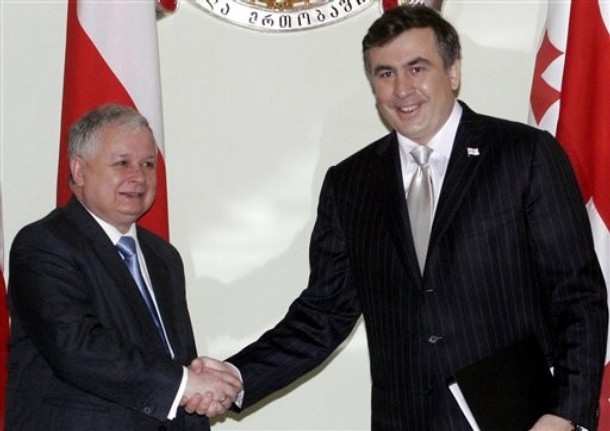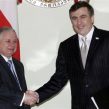
Shooting Incident in Georgia: Information Warfare Heats Up
Publication: Eurasia Daily Monitor Volume: 5 Issue: 226
By:

On November 23, in an already tense situation between Moscow and Tbilisi, automatic gunfire was allegedly directed toward a motorcade taking Georgian President Mikheil Saakashvili and Polish President Lech Kaczynski to the village of Metekhi, in Kaspi District, to meet victims of the Russian-Georgian war. Kaczynski and Saakashvili decided to approach the Akhalgori checkpoint, which resulted in the shooting incident. Georgian authorities lost no time in unequivocally blaming Moscow for the incident, while predictable denials emerged from the Russian Ministry of Defense over the involvement of any Russian “peacekeeper” and from within the separatist authorities in South Ossetia. Speaker of Parliament Davit Bakradze warned:
"I hope that this attack on the president of an EU and NATO member country—the fact that fire was opened in his direction—will serve as a very serious warning signal to the international community and a very serious warning signal to those states that may still harbor illusions about the situation among the current Russian authorities. An absolutely brazen and reckless occupation force is in Georgian territory at present" (Imedi TV, November 23).
Sources close to the Polish President could not confirm that the motorcade had actually been fired on or whether what they heard had, in fact, constituted “warning shots.” Kaczynski told Polish reporters that his convey had gone to a place where “Russians should not be,” and they heard machine gun fire about 30 meters away. Polish presidential secretary of state Michal Kaminski claimed that Russian soldiers were within 30 meters when the shots rang out. Motives for such an action are not difficult to find, with the various sides and Georgia’s plethora of analysts putting forward their own theories. What is clear is that tension in the region remains high. Asked why the cavalcade went toward South Ossetia, President Kaczynski answered, “So that I could see that the Russians were in places not covered by the [peace] plan. They should not have been there. I think that it was the duty of a person who feels [himself] to be Georgia’s ally and represents EU and NATO countries to see that place,” added Kaczynski (Imedi TV, November 23).
President Kaczynski stressed that the shooting incident showed that the six-point peace plan had not been working. “It is obvious evidence that the so-called six-point plan has not been implemented, it does not resemble the real situation,” Kaczynski said at a press conference organized after his safe return to Tbilisi (PAP News Agency, November 23). Kaczynski appealed for U.S., EU, and NATO recognition of the failure of the ceasefire agreement and called for urgent action before it was too late: “The [gun]fire was opened on Georgian territory which was controlled by the authorities in Tbilisi before August,” he said.
Also on November 23 Boris Atoyev, chairman of South Ossetia’s security agency said that the situation in the vicinity of the Georgian village of Akhmadzi, which borders on South Ossetia’s Akhalgori District, has again become “complicated.” Atoyev, in a clear effort to create a sense of provocation by the Georgians, alleged that “A build-up of Georgian military units, as well as equipment, has been observed in the area” (Interfax, November 23).
Georgia’s three nationwide TV networks—Rustavi-2, Imedi, and the Public Broadcaster Public TV—showed a film they claimed had been shot from inside the Georgian leader’s vehicle by President Saakashvili’s “personal camera operator.” The footage shows a group of armed men standing in a group outside. A shot is then heard, followed by a commotion; police cars are seen driving away. It is unclear whether this showed the incident itself or was filmed in its aftermath. One thing is clear, however: the film will have great value in the ensuing information warfare campaign (Channel 1, November 23).
Though in itself, the shooting incident was alarming, it is part of a wider spiral of claims and counter-claims, tension and disinformation. What we are witnessing at present is not simply a recurrence of old tension but an active information war that is centered on forcing Western states and multilateral bodies to divert their attention from what is unfolding on the ground and instead to focus on the origins and motives for the August war. Both Russia and Georgia are equally active in this information campaign. Policy planners in the West should identify its dangers. If the West is drawn into this claim-counter claim conflict and is compelled to assess with whom to side, there is a risk that new violence could erupt as one or the other seeks to blacken the enemy in order to score international points.
This battle of words has been highlighted by Georgian State Minister for Reintegration Temur Iakobashvili, who said that an information war for international public opinion was in progress and claimed that Moscow was investing large sums of money in a propaganda campaign to change the West’s perception of the conflict. “We know for sure that Russia allocated quite an impressive number of dollars to spin anti-Georgian sentiments in the West, and we see some results of that, but I think truth will prevail,” he told Al Jazeera.
The frequency of Georgia government officials visiting Western countries, promoting their view of the war, and Russian diplomats questioning everything from official statements out of Tbilisi seem to back Iakobashvili’s claims. For example, two professionally designed websites, “Truth for Ossetia” and “Help Ossetia Now,” have recently appeared portraying Georgia as the aggressor. “I think the media may have been embarrassed when they realized how badly they were being manipulated by Georgia’s propaganda campaign and maybe they were slow to correct the mistruths,” said one of the websites’ authors, Lira Tskhovrebova of the Association of South Ossetian Women for Democracy and Human Rights (www.english.aljazeera.net, Doha, November 23).
The EU has confirmed that it will form a commission to investigate the war. It will present its conclusions in July 2009. Yet, the shooting incident in Georgia and its subsequent projection of political point scoring in the international media, should not mask either the present high state of tension in Georgia or the emergence of an information warfare campaign that may be a precursor to more violence in the region.




